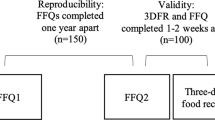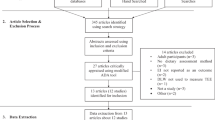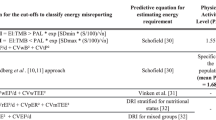Abstract
Background/Objectives:
This article summarizes 12 dietary-reporting methodological studies with children (six validation studies, one non-validation study, five secondary analyses studies of data from one or more of the six validation studies), identifies research gaps and provides recommendations for (a) improving children's recall accuracy and (b) details to specify in publications of studies that utilize children's dietary recalls.
Subjects/Methods:
Randomly selected children (aged 9–10 years) were observed eating school breakfast and school lunch, and interviewed to obtain dietary recalls.
Results:
Children's recall accuracy improved slightly between the first and third recalls, but an individual child's accuracy was inconsistent from one interview to the next. Although accuracy was poor overall, it was better for boys with reverse-order (evening-to-morning) prompts and for girls with forward-order (morning-to-evening) prompts. Children recalled breakfast intake less accurately than lunch intake. Children's accuracy did not depend on whether recalls were obtained in person or by telephone, but was better for recalls obtained with an open format than a meal format. Retention interval was crucial as children's accuracy was better for prior-24-h recalls (about the 24 h immediately preceding the interview) than for previous-day recalls (about midnight to midnight of the day before the interview). Observations of school meals did not affect children's recalls. Children's recall accuracy was related to their age/sex body mass index percentile. Conventional report rates (which disregard accuracy for items and amounts) overestimated accuracy for energy and macronutrients, and masked complexities of recall error.
Conclusions:
Research concerning errors in children's dietary recalls provides insight for improving children's recall accuracy.
This is a preview of subscription content, access via your institution
Access options
Subscribe to this journal
Receive 12 print issues and online access
$259.00 per year
only $21.58 per issue
Buy this article
- Purchase on Springer Link
- Instant access to full article PDF
Prices may be subject to local taxes which are calculated during checkout
Similar content being viewed by others
References
Baglio ML, Baxter SD, Guinn CH, Thompson WO, Shaffer NM, Frye FHA (2004). Assessment of interobserver reliability in nutrition studies that use direct observation of school meals. J Am Diet Assoc 104, 1385–1393.
Baranowski T, Baranowski J, Cullen KW, Marsh T, Islam N, Zakeri I et al. (2003). Squire's Quest! Dietary outcome evaluation of a multimedia game. Am J Prev Med 24, 52–61.
Baranowski T, Smith M, Baranowski J, Wang DT, Doyle C, Lin LS et al. (1997). Low validity of a seven-item fruit and vegetable food frequency questionnaire among third-grade students. J Am Diet Assoc 97, 66–68.
Baxter SD, Royer JA, Hardin JW, Guinn CH, Smith AF (2007a). Fourth-grade children are less accurate in reporting school breakfast than school lunch during 24-hour dietary recalls. J Nutr Educ Behav 39, 126–133.
Baxter SD, Smith AF, Guinn CH, Thompson WO, Litaker MS, Baglio ML et al. (2003a). Interview format influences the accuracy of children's dietary recalls validated with observations. Nutr Res 23, 1537–1546.
Baxter SD, Smith AF, Hardin JW, Nichols MN (2007b). Conclusions about children's reporting accuracy for energy and macronutrients over multiple interviews depend on the analytic approach for comparing reported information to reference information. J Am Diet Assoc 107, 595–604.
Baxter SD, Smith AF, Hardin JW, Nichols MN (2007c). Conventional energy and macronutrient variables distort the accuracy of children's dietary reports: illustrative data from a validation study of effect of order prompts. Prev Med 44, 34–41.
Baxter SD, Smith AF, Litaker MS, Guinn CH, Nichols MN, Miller PH et al. (2006a). Body mass index, sex, interview protocol, and children's accuracy for reporting kilocalories observed eaten at school meals. J Am Diet Assoc 106, 1656–1662.
Baxter SD, Smith AF, Litaker MS, Guinn CH, Shaffer NM, Baglio ML et al. (2004). Recency affects reporting accuracy of children's dietary recalls. Ann Epidemiol 14, 385–390.
Baxter SD, Smith AF, Nichols MN, Guinn CH, Hardin JW (2006b). Children's dietary reporting accuracy over multiple 24-hour recalls varies by body mass index category. Nutr Res 26, 241–248.
Baxter SD, Thompson WO, Davis HC (2001). Trading of food during school lunch by first- and fourth-grade children. Nutr Res 21, 499–503.
Baxter SD, Thompson WO, Litaker MS, Frye FHA, Guinn CH (2002). Low accuracy and low consistency of fourth-graders’ school breakfast and school lunch recalls. J Am Diet Assoc 102, 386–395.
Baxter SD, Thompson WO, Litaker MS, Guinn CH, Frye FHA, Baglio ML et al. (2003b). Accuracy of fourth-graders’ dietary recalls of school breakfast and school lunch validated with observations: in-person versus telephone interviews. J Nutr Educ Behav 35, 124–134.
Baxter SD, Thompson WO, Smith AF, Litaker MS, Yin Z, Frye FHA et al. (2003c). Reverse versus forward order reporting and the accuracy of fourth-graders’ recalls of school breakfast and school lunch. Prev Med 36, 601–614.
Burghardt J, Ensor T, Hutchinson G, Weiss C, Spencer B (1993). The School Nutrition Dietary Assessment Study: Data Collection and Sampling (Contract No. 53-3198-0-16; MPR Reference No. 7937-140). Princeton, NJ: Mathematica Policy Research, Inc. Retrieved August 6, 2008, from http://www.fns.usda.gov/oane/MENU/Published/CNP/FILES/SNDA-Datacol.pdf.
Buzzard M (1998). 24-hour dietary recall and food record methods. In: Willett W (ed). Nutritional Epidemiology, 2nd edn. Oxford University Press: New York, NY. pp 50–73.
Byers T, Treiber F, Gunter E, Coates R, Sowell A, Leonard S et al. (1993). The accuracy of parental reports of their children's intake of fruits and vegetables: Validation of a food frequency questionnaire with serum levels of carotenoids and vitamins C, A, and E. Epidemiology 4, 350–355.
Centers for Disease Control and Prevention and US Department of Health and Human Services. About BMI for Children and Teens Retrieved August 6, 2008 from www.cdc.gov/nccdphp/dnpa/bmi/childrens_BMI/about_childrens_BMI.htm.
Domel SB, Baranowski T, Davis HC, Leonard SB, Riley P, Baranowski J (1994). Fruit and vegetable food frequencies by fourth and fifth grade students: validity and reliability. J Am Coll Nutr 13, 33–39.
Dwyer J (1999). Dietary assessment. In: Shils ME, Olson JA, Shike M, Ross AC (eds). Modern Nutrition in Health and Disease, 9th edn. Williams & Wilkins: Baltimore. pp 937–959.
Eck LH, Klesges RC, Hanson CL (1989). Recall of a child's intake from one meal: are parents accurate? J Am Diet Assoc 89, 784–789.
Emmons L, Hayes M (1973). Accuracy of 24-hr. recalls of young children. J Am Diet Assoc 62, 409–415.
Field AE, Peterson KE, Gortmaker SL, Cheung L, Rockett H, Fox MK et al. (1999). Reproducibility and validity of a food frequency questionnaire among fourth to seventh grade inner-city school children: implications of age and day-to-day variation in dietary intake. Public Health Nutr 2, 293–300.
Frank GC (1991). Taking a bite out of eating behavior: food records and food recalls of children. J Sch Health 61, 198–200.
Gillman MW, Hood MY, Moore LL, Singer MR (1994). Feasibility and acceptance of food records among inner-city fifth-grade students. J Am Diet Assoc 94, 1311–1313.
Livingstone MBE, Robson PJ (2000). Measurement of dietary intake in children. Proc Nutr Soc 57, 279–293.
Lohman TG, Roche AF, Martorell R (1988). Anthropometric Standardization Reference Manual. Human Kinetics Books: Champaign, IL.
Luepker RV, Perry CL, McKinlay SM, Nader PR, Parcel GS, Stone EJ et al. (1996). Outcomes of a field trial to improve children's dietary patterns and physical activity: The Child and Adolescent Trial for Cardiovascular Health (CATCH). J Am Med Assoc 275, 768–776.
Lytle LA, Dixon LB, Cunningham-Sabo L, Evans M, Gittelsohn J, Hurley J et al. (2002). Dietary intakes of Native American children: findings from the Pathways Feasibility Study. J Am Diet Assoc 102, 555–558.
Maternal and Child Health Bureau. Accurately weighing & measuring: Technique Retrieved August 6, 2008 from http://depts.washington.edu/growth/module5/text/intro.htm.
Moore HJ, Ells LJ, McLure SA, Crooks S, Cumbor D, Summerbell CD et al. (2008). The development and evaluation of a novel computer program to assess previous-day dietary and physical activity behaviours in school children: the Synchronised Nutrition and Activity ProgramTM (SNAPTM). Br J Nutr 99, 1266–1274.
Perry CL, Bishop DB, Taylor G, Murray DM, Mays RW, Dudovitz BS et al. (1998). Changing fruit and vegetable consumption among children: The 5-A-Day Power Plus program in St Paul, Minnesota. Am J Public Health 88, 603–609.
Receveur O, Morou K, Gray-Donald K, Macaulay AC (2008). Consumption of key food items is associated with excess weight among elementary-school-aged children in a Canadian First Nations Community. J Am Diet Assoc 108, 362–366.
Regents of the University of Minnesota. NDSR Nutrition Data System for Research 2007. Minneapolis, MN.
Rockett HR, Berkey CS, Colditz GA (2003). Evaluation of dietary assessment instruments in adolescents. Curr Opin Clin Nutr Metab Care 6, 557–562.
Rockett HR, Breitenbach M, Frazier AL, Witschi J, Wolf AM, Field AE et al. (1997). Validation of a youth/adolescent food frequency questionnaire. Prev Med 26, 808–816.
Shaffer NM, Baxter SD, Thompson WO, Baglio ML, Guinn CH, Frye FHA (2004). Quality control for interviews to obtain dietary recalls from children for research studies. J Am Diet Assoc 104, 1577–1585.
Simons-Morton BG, Baranowski T (1991). Observation in assessment of children's dietary practices. J Sch Health 61, 204–207.
Simons-Morton BG, Forthofer R, Huang IW, Baranowski T, Reed DB, Fleishman R (1992). Reliability of direct observation of schoolchildren's consumption of bag lunches. J Am Diet Assoc 92, 219–221.
Smith AF (1991). Cognitive Processes in Long-term Dietary Recall. National Center for Health Statistics, Vital and Health Statistics, Series 6, No. 4: Hyattsville, MD.
Smith AF (1999). Concerning the suitability of recordkeeping for validating and generalizing about reports of health-related information. Rev Gen Psychol 3, 133–150.
Smith AF, Baxter SD, Hardin JW, Guinn CH, Royer JA, Litaker MS (2007a). Validation-study conclusions from dietary reports by fourth-grade children observed eating school meals are generalisable to dietary reports by comparable children not observed. Public Health Nutr 10, 1057–1066.
Smith AF, Baxter SD, Hardin JW, Nichols MN (2007b). Conventional analyses of data from dietary validation studies may misestimate reporting accuracy: illustration from a study of the effect of interview modality on children's reporting accuracy. Public Health Nutr 10, 1247–1256.
Smith AF, Jobe JB, Mingay DJ (1991). Retrieval from memory of dietary information. Appl Cogn Psychol 5, 269–296.
Todd KS, Kretsch MJ (1986). Accuracy of the self-reported dietary recall of new immigrant and refugee children. Nutr Res 6, 1031–1043.
US Department of Agriculture and Agricultural Research Center. USDA Automated Multiple-Pass Method. Retrieved August 6, 2008 from http://www.ars.usda.gov/Services/docs.htm?docid=7710.
US Department of Agriculture and Food and Nutrition Service (2007). Road to SMI Success—A Guide for School Foodservice Directors Retrieved August 6, 2008 from http://www.fns.usda.gov/tn/Resources/roadtosuccess.html.
US Department of Agriculture, Food and Nutrition Service, Office of Research, Nutrition and Analysis (2007) School Nutrition Dietary Assessment Study-III: Volume II: Student Participation and Dietary Intakes, by A Gordon et al., Project Officer: P McKinney, Report No. CN-7-SNDA-III. Alexandria, VA. Retrieved December 18, 2008, from http://www.fns.usda.gov/oane/menu/Published/CNP/FILES/SNDAIII-Vol2.pdf#xml.
Vereecken CA, Maes L (2003). A Belgian study on the reliability and relative validity of the Health Behaviour in School-Aged Children food-frequency questionnaire. Public Health Nutr 6, 581–588.
Wong SS, Boushey CJ, Novotny R, Gustafson DR (2008). Evaluation of a computerized food frequency questionnaire to estimate calcium intake of Asian, Hispanic, and Non-Hispanic white youth. J Am Diet Assoc 108, 539–543.
Acknowledgements
The 12 studies were supported by the four above mentioned grants with Suzanne D Baxter as the Principal Investigator. Appreciation is extended (a) to the children and staff of the elementary schools, the School Nutrition Program and the Richmond County Board of Education (Georgia, USA) for allowing data collection, (b) to the co-authors of publications for the 12 studies and (c) to Caroline H Guinn, RD, LD; Elizabeth J Herron, MA; Alyssa J Mackelprang, BS; and Julie A Royer, MSPH for providing feedback on a draft of this article.
Author information
Authors and Affiliations
Corresponding author
Rights and permissions
About this article
Cite this article
Baxter, S. Cognitive processes in children's dietary recalls: insight from methodological studies. Eur J Clin Nutr 63 (Suppl 1), S19–S32 (2009). https://doi.org/10.1038/ejcn.2008.61
Published:
Issue Date:
DOI: https://doi.org/10.1038/ejcn.2008.61
Keywords
This article is cited by
-
Evaluating OzHarvest’s primary-school Food Education and Sustainability Training (FEAST) program in 10–12-year-old children in Australia: protocol for a pragmatic cluster non-randomized controlled trial
BMC Public Health (2021)
-
Poor food and nutrient intake among Indigenous and non-Indigenous rural Australian children
BMC Pediatrics (2012)
-
Investigating Children's Physical Activity and Sedentary Behavior Using Ecological Momentary Assessment With Mobile Phones
Obesity (2011)
-
Recommendations for a trans-European dietary assessment method in children between 4 and 14 years
European Journal of Clinical Nutrition (2011)
-
Feasibility of 2 × 24-h dietary recalls combined with a food-recording booklet, using EPIC-Soft, among schoolchildren
European Journal of Clinical Nutrition (2011)



